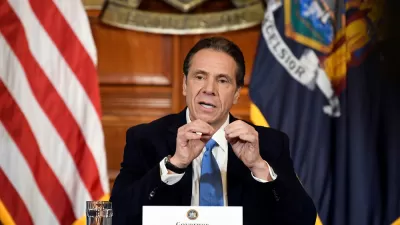An earlier post on New York Gov. Andrew Cuomo's big capital project proposal this week gave barely a mention of his new plans for the renovation, or rebirth, of Penn Station, America's busiest rail station.
The editorial board of The New York Times recaps part of the governor's busy week proposing new renovations to Penn Station, compared in the editorial to "a minimum-security prison that sells magazines and popcorn."
Between Proposal 5 (lower Thruway tolls!) and 7 (a bigger Javits Convention Center!), was one to make a New Yorker perk up: Proposal 6, transforming Penn Station.
The editorial indicates that developers had been selected to perform the transformation of Penn Station and Farley Post Office building into Moynihan Station and that while the first phase is underway, "the overall project has been stalled."
"It is unclear exactly how the more than $3 billion project, which the governor is calling the Empire Station Complex, will be paid for, but Mr. Cuomo is expected to unveil a financial plan for his transportation network at next week’s State of the State speech," wrote The New York Times' Emma G. Fitzsimmons and Charles V. Bagli on Wednesday.
The developers initially selected for the project ten years ago, Related Companies and Vornado Realty, "had agreed to pay the state more than $200 million for the Farley building and $110 million for development rights that they planned to transfer across Eighth Avenue for a residential tower," wrote Fitzsimmons and Bagli.
Should the two companies not be selected for Empire State Complex, "the state would be required to reimburse Vornado and Related for more than $30 million," according to Fitzsimmons and Bagli.
As in the first post on Gov. Cuomo's infrastructure agenda, the editorial board references New York's premier, though controversial builder: "Mr. Cuomo seems to have gone from zero to Robert Moses in 60 seconds."
FULL STORY: A New Old Plan for Penn Station

Maui's Vacation Rental Debate Turns Ugly
Verbal attacks, misinformation campaigns and fistfights plague a high-stakes debate to convert thousands of vacation rentals into long-term housing.

Planetizen Federal Action Tracker
A weekly monitor of how Trump’s orders and actions are impacting planners and planning in America.

Chicago’s Ghost Rails
Just beneath the surface of the modern city lie the remnants of its expansive early 20th-century streetcar system.

Bend, Oregon Zoning Reforms Prioritize Small-Scale Housing
The city altered its zoning code to allow multi-family housing and eliminated parking mandates citywide.

Amtrak Cutting Jobs, Funding to High-Speed Rail
The agency plans to cut 10 percent of its workforce and has confirmed it will not fund new high-speed rail projects.

LA Denies Basic Services to Unhoused Residents
The city has repeatedly failed to respond to requests for trash pickup at encampment sites, and eliminated a program that provided mobile showers and toilets.
Urban Design for Planners 1: Software Tools
This six-course series explores essential urban design concepts using open source software and equips planners with the tools they need to participate fully in the urban design process.
Planning for Universal Design
Learn the tools for implementing Universal Design in planning regulations.
planning NEXT
Appalachian Highlands Housing Partners
Mpact (founded as Rail~Volution)
City of Camden Redevelopment Agency
City of Astoria
City of Portland
City of Laramie




























